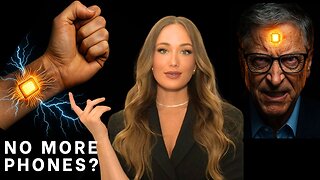Premium Only Content

We Are in Simulation?
The concept that we might be living within a simulation has been a topic of philosophical and scientific debate for years, popularized in part by the work of philosophers like Nick Bostrom and by cultural references such as the movie "The Matrix." However, it's essential to understand that this idea currently remains speculative and lacks empirical evidence.
Here's a breakdown of the main points and discussions surrounding the simulation hypothesis:
1. **The Simulation Argument by Nick Bostrom**: Philosopher Nick Bostrom proposed the simulation argument in 2003. He posited that at least one of the following statements must be true:
- Humanity is likely to go extinct before reaching a "posthuman" stage capable of running ancestor simulations.
- Posthuman civilizations are not interested in running ancestor simulations.
- We are almost certainly living in a simulation.
2. **Technological Advancements**: The hypothesis relies on the assumption that future civilizations will develop immensely powerful computers capable of running simulations indistinguishable from reality to the simulated beings. This idea draws upon the exponential growth of computing power and the potential for advanced civilizations to harness it.
3. **Simulation Ethics**: There are ethical implications to consider if we ever reach the point where we can create realistic simulations. Questions arise about the treatment of simulated beings and the responsibility of the creators towards their creations.
4. **Scientific Investigations**: Some scientists have pondered whether certain phenomena in physics and cosmology could hint at the universe being a simulation. For instance, the discovery of constraints or underlying rules in the fabric of reality might suggest a simulated nature.
5. **Quantum Mechanics and Simulation Hypothesis**: Some aspects of quantum mechanics, such as the indeterminate nature of particles until observed, have led to speculation that the universe might be a simulation, with computational resources being allocated only when observations are made.
6. **Limitations and Criticisms**: Critics argue that the simulation hypothesis relies heavily on assumptions and lacks empirical evidence. Additionally, some argue that even if we were in a simulation, it might not be meaningful or practical to prove or disprove it.
In summary, while the simulation hypothesis sparks intriguing philosophical and scientific discussions, it currently remains a speculative idea without conclusive evidence. It prompts us to contemplate the nature of reality, the limits of technology, and the ethical considerations of advanced civilizations.
-
 1:32:53
1:32:53
Flyover Conservatives
8 hours agoRicky Schroder Exposes How Hollywood Planted Him as a Child Star | FOC Show
22K3 -
 LIVE
LIVE
JahBlessCreates
3 hours ago🎉 TEKKEN TING, and maybe some music...
173 watching -
 LIVE
LIVE
GritsGG
4 hours agoTop 250 Ranked Grind! Dubulars!🫡
57 watching -
 LIVE
LIVE
StuffCentral
3 hours agoStar Stuffy
24 watching -
 6:02
6:02
Blackstone Griddles
5 hours agoPrime Rib Brisket Burgers on the Blackstone Griddle
7.29K2 -
 LIVE
LIVE
HELMETFIRE
2 hours ago🟢HELMETFIRE PLAYS: Silksong Part 4🟢
19 watching -
 1:14:07
1:14:07
Glenn Greenwald
9 hours agoGlenn Takes Your Questions: Billionaires, Bari Weiss and Journalism | SYSTEM UPDATE #509
67.5K34 -
 LIVE
LIVE
StevieTLIVE
3 hours agoFriday Night HYPE Warzone Games with Stevie
124 watching -
 4:11:15
4:11:15
SavageJayGatsby
1 day agoLet's Play: Sea of Thieves | Friend Friday
18.6K2 -
 19:51
19:51
Robbi On The Record
1 day agoElectronic Tattoos Measuring Thoughts? From iPhone to iSkin
32K26